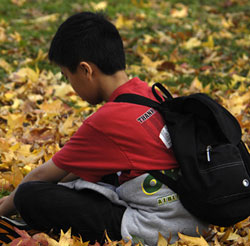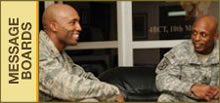24/7 HELP
Press "1"
Helping Children Through the Grieving Process

Source: DoD photo by Cherie A. Thurlby/Released
When a tragedy occurs, and a military parent does not return home, you might think consoling a grieving child would be impossible. Dealing with their emotions in addition to yours may seem like a daunting task. There are many things, however, that surviving parents and other caring adults can do to help children cope with a loss.
What Can You Do as a Parent or Other Adult?
As they react to the death of a parent, you might feel powerless to make a child feel better. Yet, parents and caring adults have a great natural ability to soothe – even if they are sad themselves. Here are some helpful tips:1, 2, 3, 4
- Be clear and make sure to use the word “death” when talking with kids. Referring to death using phrases such as “going to sleep” can be confusing.
- Kids will need to talk about loss more than once. Follow your child’s lead and stay open to talking as needed over time. It helps just to be ready and accessible, rather than pushing your child to talk.
- Take care of yourself by eating well, getting plenty of rest and exercising. This will help you build resilience, tackle stress and have the strength to be there for your family.
- Try to get back to normal routines and schedules at home. Bedtime rituals and keeping up with school activities can help kids feel secure.
- Take note of your child’s behavior to get a sense of how they are feeling. If he or she acts out, remember that it may be because of anger. Talk about how to express that anger in other ways, such as through drawing or writing.
- Let children know that any feelings they may have are okay. Sadness, anger, guilt and even happiness, as their lives keep moving, are all normal.
It can help when adults show that they are also feeling sad, but try not to let emotions get out of control. For instance, it can be healthy to cry in front of kids, but try not to display emotions in a way that could cause a child to feel unsafe, like throwing or breaking objects.
While keeping in mind these tips, the most important thing to remember is that children faced with loss need the love and support of the adults around them.
Sesame Street Helps Children Cope with Grief
Find out how Elmo and other familiar characters from Sesame Street help children cope with grief.Understanding How Children Grieve
Grief can affect how children express their feelings, relate to others, learn and process information, and behave. 5 Everyone handles loss differently, and the same is true for children. Children may have a range of responses to the loss of a loved one, including one or more of the following: 3, 4, 6
- Shock or detachment. At times, children may seem like they are not upset. However, this can be a sign of shock. Distancing themselves from their feelings may be a way to ward off pain.
- Regression. Kids may act younger than their age or cling more to the surviving parent. For example, they may talk like a baby or go back to wetting the bed.
- Acting out. Kids who misbehave may be expressing anger. Acting out can help them feel in control of something at a time when they have no control over tragic events.
- Lack of acceptance. It can be hard for kids to believe or accept the loss. They might show this by asking the same questions repeatedly, or talking about the person who died like he or she might be coming back.
- Feelings of guilt. Younger children may worry that they caused a parent’s death because they were once angry with them. Older children may feel survivor’s guilt.
- Sadness and depression. Just like adults, children can feel down and struggle to feel positive about themselves or their surroundings.
In the short-term, these reactions to grief are common. If these feelings or behaviors don’t go away over time, your child may be having more serious problems coping with death. Other signs that a child may have a more serious problem, such as depression, can include:3, 6
- Loss of interest in day-to-day activities and events
- Trouble sleeping
- Loss of appetite
- Fear of being alone
- Imitating the dead person to a great degree
- Talks about joining the dead person
- Staying away from friends
- Doing poorly at school or not wanting to go to school
If these signs are exhibited for any lengthy period, you should seek help from a psychological health professional.
What Children Know About Death
As you move through the grieving process, keep in mind that each child is unique in what they know and feel about death. Reactions to grief generally vary based on age. Here are some insights on how different age groups comprehend loss: 2, 3, 4
- Infants and toddlers may be able to tell if the adults around them are sad, but they do not understand the meaning of death.
- Preschoolers may not understand that death is permanent. They may also hold onto links between events. For example, if someone dies in a plane crash, they may worry that flying always causes death.
- Early elementary school-aged kids begin to understand that death is final. They may see death as something that happens to other people, but not to themselves or their families.
- Middle school-aged kids understand that death is final, with insight into how the body stops functioning.
- Teenagers fully understand the meaning of death and, conversely, may focus on trying to understand the meaning of life.
TAPS (Tragedy Assistance Program for Survivors)
Visit their website to order "A Kids Journey of Grief, TAPS Edition."Reaching Out for Help
Mourning the loss of a loved one is painful, and may become overwhelming if you have a child that needs help with coping. You do not have to do it alone. There are many from whom you can seek support: 1, 2
- Doctors
- Mental health professionals
- School officials
- Military resources (see the Additional Resources below)
- Places of worship
- Other families with shared experience
Keep in mind that reaching out for help is a sign of strength – strength that your child can learn from and respect. This lesson, and the others you teach in tough times, can help your child build important coping skills for life.2
Log on to Real Warriors Live Chat or call the DCoE Outreach Center at 866-966-1020 for free, confidential guidance on tools for resilience and recovery. Trained health resource consultants are available to talk 24/7.
Connect With Other Military Families
Share your stories of resilience and recovery with other military families at the Real Warriors Message Boards.Additional Resources
- Army Morale Welfare and Recreation
- Navy Morale Welfare and Recreation
- Marine Corps Community Services (MCCS)
- Air Force Personnel Center
- Child's Stress and Grief
- Helping Children Cope with Loss Resulting from War or Terrorism
- Living in the New Normal
- Talking to Children
- Traumatic Grief in Military Children [PDF 1.12KB]
Sources
1 “Helping Bereaved Military Children,” Defense Centers of Excellence for Psychological Health & Traumatic Brain Injury. Last accessed March 14, 2012.
2 “Helping Your Child Deal with Death,” KidsHealth. Last accessed March 14, 2012.
3 “Helping Children Cope with Loss Resulting from War or Terrorism,” Mental Health America. Last accessed March 14, 2012.
4 “Helping Children Cope With Loss, Death and Grief: Tips for Teachers and Parents,” [PDF 73.3KB] National Association of School Psychologists. Last accessed March 14, 2012.
5 “Sesame Workshop Helps Children Cope with Grief,” Real Warriors. Last accessed March 14, 2012.
6 “Facts for Families: Children and Grief,” American Academy of Child & Adolescent Psychiatry. Last accessed March 14, 2012.








